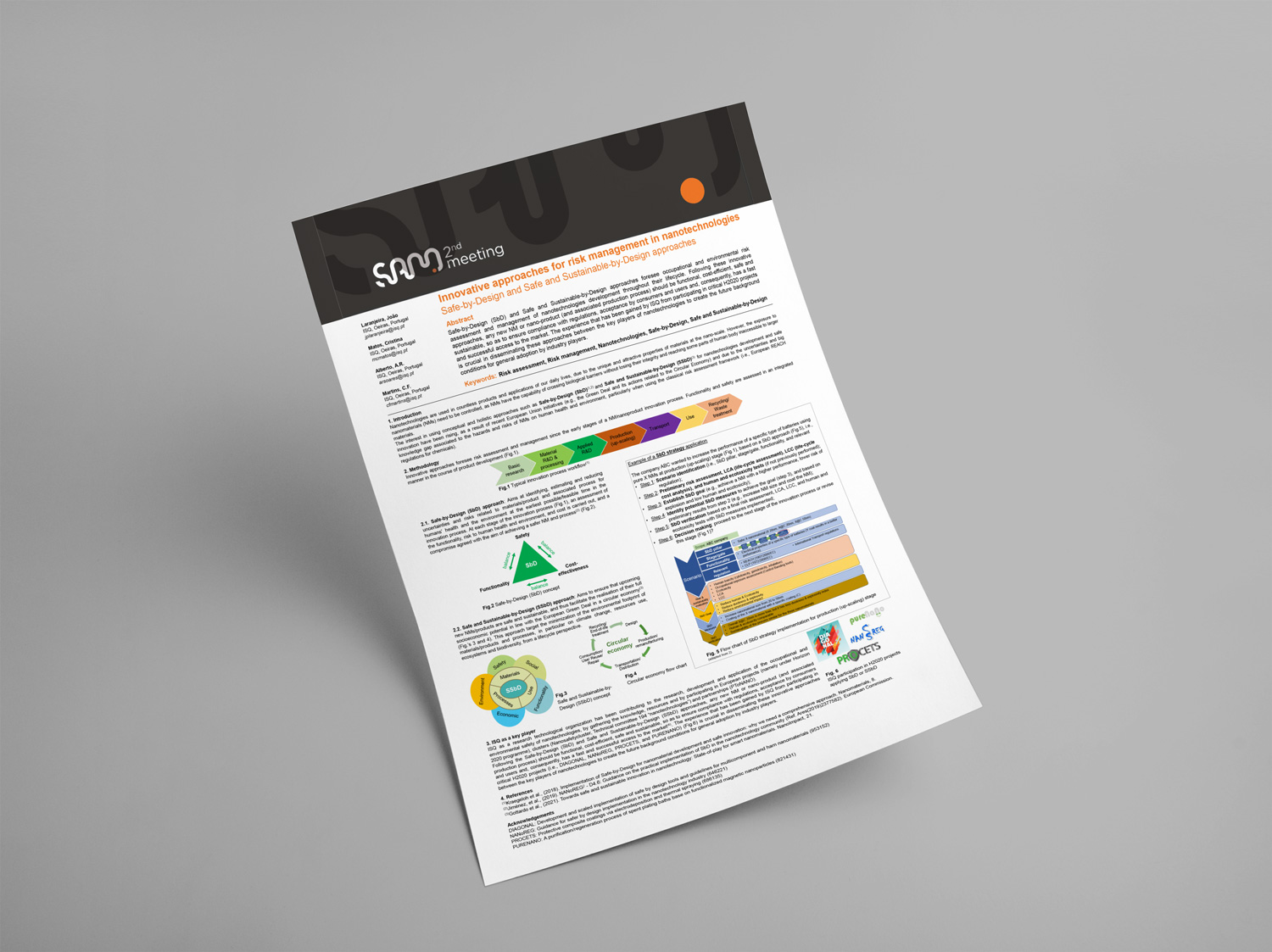26Oct
Poster presentation @ SUSTAINABLE AND SMART ADVANCED MANUFACTURING MEETING at ESAN, University of Aveiro
by DIAGONAL, 0 Comments

On the 21st – 22nd October 2021 our partner Instituto de Soldadura e Qualidade presented DIAGONAL with a poster at the 2nd SUSTAINABLE AND SMART ADVANCED MANUFACTURING MEETING at ESAN, University of Aveiro.
Abstract
Nanotechnologies are used in many products and applications of our daily lives such as electronics, healthcare, construction, and consumer goods. This broad range of applications results from the unique and attractive properties of materials at nanoscale (i.e., nanomaterials), comparatively with larger materials of the same compounds (e.g., electric conductivity, strength, weight). Although the use of nanomaterials also poses some challenges, as their nano dimensions result in a higher specific area (than in the macroscale), and consequently the reactivity is also higher, which may affect their (eco)toxicological profiles and exposure characteristics (particularly for insoluble or slightly soluble nanomaterials)(1). Moreover, nanomaterials have the capability of crossing biological barriers without losing their integrity and reaching some part of human body inaccessible to larger materials(1). The primary route of entry of nanomaterials to the human body is inhalation, however, it can also occur by skin exposure and ingestion. In fact, the European Agency for Safety and Health at Work identified nanomaterials as one of the major emerging risks in occupational safety and health (EU-OSHA)(2).
The uncertainties and big knowledge gap associated to the adverse effects of nanomaterials on human health and environment have been contributing to the adoption of the conceptual approach Safe-by-Design (SbD)(3) among academic and R&D industry players. The SbD conceptual approach aims to reduce uncertainties and/or increase human health and environmental safety of nanotechnologies, based on the risk assessment and management throughout all stages of the innovative process.
The safety of nanomaterials should follow the classical risk assessment framework specified by the European REACH regulations for chemicals, which includes three main steps: hazard characterization, exposure assessment and risk evaluation(4). However, the uncertainties and the lack of specific (eco)toxicological data complicates the risk assessment. In order to overcome the unknown or uncertain (eco)toxicological properties, Control Banding (CB) tools were developed to assess and manage the potential risks associated with occupational and environmental exposure to nanomaterials throughout their life cycle (e.g., Stoffenmanager Nano, NanoSafer)(5).
In recent years, a more holistic methodology has been proposed for nanotechnologies, that integrates safety, environmental, economic, social, and functional aspects, i.e., the Safe and Sustainable-by-Design (SSbD) approach(6) (Figure 1). In this approach, risk assessment, life-cycle assessment (LCA), and life-cycle cost analysis (LCC) are all combined for the development of sustainable technologies, based on a comparison with traditional products/processes (if any). This information can then be used in the decision-making process about transferring the innovative technology from an industrial (pre-commercial) pilot line to mass production. ISQ as a research technological organization has been contributing to the research, development and application of the occupational and environmental safety of nanotechnologies, by gathering the knowledge, resources and by participating in European projects (namely under Horizon 2020 programme), clusters (Nanosafetycluster, Technical committee 194 “nanotechnologies”) and partnerships (PToNANO). The complexity and novelty of both SbD and SSbD approaches applied to nanotechnologies create limitations of their adoption by industry players. This emphasizes the role of ISQ in disseminating these innovative approaches between the key players of nanotechnologies to create the future background conditions, based on the experience gathered from the participation in critical H2020 projects (i.e., NANoREG, PROCETS, PURENANO and DIAGONAL).
Please let us know if you have any objections.
